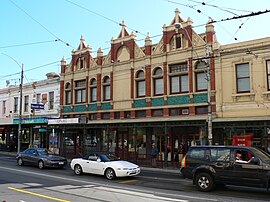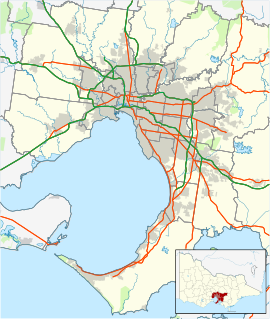Cremorne, Victoria
|
Cremorne Melbourne, Victoria |
|||||||||||||
|---|---|---|---|---|---|---|---|---|---|---|---|---|---|

Commercial shopfronts along Church Street
|
|||||||||||||
| Coordinates | 37°49′48″S 144°59′35″E / 37.83°S 144.993°ECoordinates: 37°49′48″S 144°59′35″E / 37.83°S 144.993°E | ||||||||||||
| Population | 1,564 (2011) | ||||||||||||
| • Density | 2,230/km2 (5,800/sq mi) | ||||||||||||
| Established | 1853 | ||||||||||||
| Postcode(s) | 3121 | ||||||||||||
| Area | 0.7 km2 (0.3 sq mi) | ||||||||||||
| Location | 2 km (1 mi) from Melbourne | ||||||||||||
| LGA(s) | City of Yarra | ||||||||||||
| State electorate(s) | Richmond | ||||||||||||
| Federal Division(s) | Melbourne | ||||||||||||
|
|||||||||||||
Cremorne is a small inner suburb of Melbourne, 2 km south-east of the CBD. Its local government area is the City of Yarra and at the 2011 Census it had a population of 1,564. It is bounded by the Yarra River, Punt Road, Swan and Church Streets, and divided down the middle by the railway to South Yarra. Covering only about a square kilometre, until 1999 Cremorne existed only as a locality in the larger suburb of Richmond. Cremorne's charm is in its rather chaotic mix of uses and the unique character resulting from being 'walled in' by main roads and railways on all sides. There are industrial icons such as Bryant and May, Rosella and the Nylex Clock, side by side with Victorian cottages, modern townhouses, offices and light industries.
Cremorne takes its name from the Cremorne Gardens, an amusement park which occupied a riverfront location in the western half of Cremorne for a period in the mid 19th century.
Cremorne Gardens occupied a river-front location in the western half of Cremorne for a brief period in the mid 19th century. They were established in 1853 by James Ellis, who had earlier managed gardens of the same name on the banks of the Thames, at Chelsea, in London. Entrepreneur George Coppin later acquired and expanded the Gardens which became a major Melbourne attraction at the time, with patrons arriving by train or boat to see wild animals, dancers and other entertainment. However the Gardens closed in 1863 and the land was sold for housing and an asylum.
...
Wikipedia

